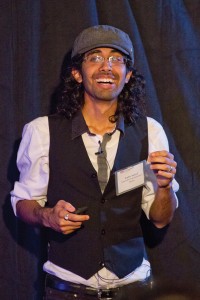USC Hosts Annual TEDxTrousdale event
Students gathered at the Caruso Catholic Center on Saturday for the second annual TEDxTrousdale event, an independently organized, student-run conference dedicated to providing students with the opportunity to collaborate and exchange ideas.

‘How to experiment’ · Raghav Bashyal, a senior majoring in interactive entertainment, was one of the seven TedxTrousdale student speakers. The event took place on Saturday. – Austin Vogel | Daily Trojan
TED is a nonprofit organization devoted to spreading ideas that range from science to business. The series of talks are events run independently in communities on a local scale. This year, the conference was held by the Academic Culture Assembly division of Undergraduate Student Government’s Program Board.
Jasmine McAllister and Erin Limlingan, the co-executive directors of the Academic Culture Assembly, were responsible for organizing the event along with a team of eight others.
“If there’s anything I want to emphasize, it’s that this event is completely student-organized and student-funded,” McAllister said.
The seven speakers for the conference were all USC students who were chosen from over 30 applicants by conference organizers in a blind application process. TED restricts the number of attendees for its affiliated events, so approximately 100 attendees also had to be selected by an application process to attend the event, McAllister said.
The speakers at the event included six undergraduate students and one graduate student. They included Zade Shakir, a senior majoring in international relations and biological sciences; Dru Erridge, a senior majoring in computer science (game design); Catherine Uong, a senior majoring in East Asian languages and cultures and business administration; Raghav Bashyal, a senior majoring in interactive entertainment; Eugene Lee, a senior majoring in architecture and Paulina Shahery, a senior majoring in architecture.
The theme of the conference was “Breaking New Ground,” and attendees were given notepads and encouraged to write and share their ideas during breaks.
Shakir was the first speaker of the day with his talk, titled, “Lessons from a Four-Year-Old Superhero.” He discussed his experience at Spirits in Action, a nonprofit organization that hosts USC’s version of the Special Olympics for developmentally-disabled youth, and how it inspired him to start Kicks for Kids, an organization that provides a healthy and active lifestyle for children with special needs who are often excluded from regular involvement in organized sports.
“Regardless of the future that I pursue, it’s going to be helping those that don’t have the access I was privileged to have,” he said.
The event progressed with a talk by Erridge, who spoke of the importance of innovation even in the face of difficulties.
“It seems to me whenever people look at hardships, all they think about is what they can do when they get out of them,” Erridge said. “But if I look at the people I admire in the world — the technology innovators like Steve Jobs or Steve Wozniak or Bill Gates or Mark Zuckerberg — they made their impact right where they were at.”
Bashyal emphasized the importance of challenging the mind in his talk, “How to Experiment: A Millennial’s Guide.”
“Think about when you’re in class, and you’re bored. There’s no Facebook or your phone to distract you, and the professor sure as hell isn’t going to distract you,” he said. “So what do you do? You start to daydream, your mind starts to entertain you. Daydreams are great places for ideas to grow.”
The event also included a surprise appearance by Ron Finley, a speaker at an official TED conference last year. He is a local, self-titled “gangster gardener” who advocates that people grow their own food as a form of defiance and for nutritional reasons in South Los Angeles, an area dominated by fast-food chains.
He gave an example of his ideal neighborhood garden.
“Now I know that I can send my son to your garden and get some onions, and you can send your daughter to mine and get some apples off the tree,” he said.
Shahery discussed the importance of being aware when going from destination to destination. She explained how she challenged herself to avoid using her cellphone when walking from place to place and how that related to the concept of deliberate irregularities.
“The paths in a Japanese tea garden have regular irregularities,” Shahery said. “Each rock is tilted so that we deliberately place our heels, then our toes, on the rock, step-by-step. This means that our attention comes back to the physical placement of our foot rather than letting our minds wander.”
Those in attendance appreciated the collaborative nature of the event.
Aseem Afsah, a freshman in the World Bachelors in Business program, said that he appreciated hearing the ideas of those more experienced.
“I feel like being a freshman, you don’t really get exposure to a lot of upperclassmen, besides through extracurriculars,” Afsah said. “So I think being able to see people who are about to graduate soon and see their ideas has been pretty cool so far.”
Rona Sheen, a freshman majoring in business administration, also appreciated the topics of the talks.
“I really liked how the first two were about how to get your ideas and ‘don’t be afraid of failure,’” Sheen said. “I liked the fourth talk Eugene Lee gave about the digital printing because I just felt his story was really personal, and it was very introspective into how he actually failed and went through that process — I really liked that.”


Who was the seventh speaker?